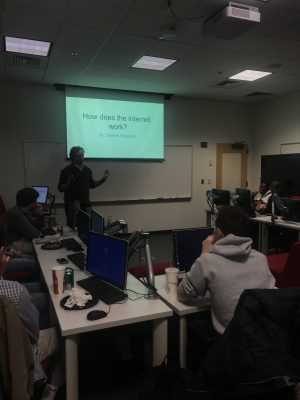 The internet: an everyday tool that has somehow become obscure and mysterious in both its definition and the way it works. On Friday, February 9, Adjunct Professor Stephen Fitzgerald tackled the daunting task of explaining how the internet works in the latest OPIM Innovate workshop. The workshop covered how we connect to the internet, how we send messages through the internet, the divisions of the internet (such as the surface web, deep web, and dark web), and websites.
The internet: an everyday tool that has somehow become obscure and mysterious in both its definition and the way it works. On Friday, February 9, Adjunct Professor Stephen Fitzgerald tackled the daunting task of explaining how the internet works in the latest OPIM Innovate workshop. The workshop covered how we connect to the internet, how we send messages through the internet, the divisions of the internet (such as the surface web, deep web, and dark web), and websites.
The internet began as a Department of Defense project, with the hopes of being able to create a communication network that could survive nuclear attack. In order to do this, the creators of the internet decided to send information in packets, dividing one message into smaller parts, sending those parts on different routes, and reuniting them later on at their appropriate destinations. Each destination that a message will encounter along its travel is referred to as an IP address. IP addresses are a series of unique numbers that distinguish computers depending on the network they are connected to. “IP addresses are like home addresses; so what we want to do is get information from one destination to another. With an IP address, we can track the steps it takes to get from my home router to google,” Fitzgerald said. Although each IP address is different, the amount of addresses is not unlimited because they are coded in binary. This means that at institutions such as UConn, users are able to login to the internet with a specific IP address, but once you log out the information will be recycled for the next user. “There are a few buildings where the huge internets of the world connect to each other. These would be places that connect the millions of IP addresses together like Time Warner, Comcast, etc. and they are filled with routers,” Fitzgerald said as he began to paint a physical picture of how the internet is connected.
“This was a good first workshop to go to because it gave information on how the internet works while reflecting real world issues like net neutrality. I think sometimes if you live on campus at a college you can shut out the outside world, so workshops are a good way to understand the real world applications of things we learn about in school,” said Brittany Reynolds a Management Informations Systems (MIS) and Psychology major (’19). Being able to use the internet is an essential skill for students in their academics and the workplace, but knowing how the internet works is an extremely useful tool for students looking to make an impact in the field of technology. “Knowing about the internet is important. With the amount of information being shared across the internet, it is important to know where that information is going, who has access and who doesn’t, and to be able to control where your information is going,” said Anthony Modolese, a senior finance major in attendance. Modolese and his friend Matthew Kopec have been taking a private independent study on the business of blockchain and are currently learning about the history of the internet. This interest in blockchain has brought them to multiple workshops and they are both interested in attending more in the future.
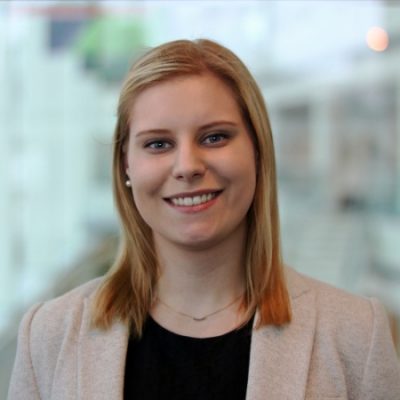
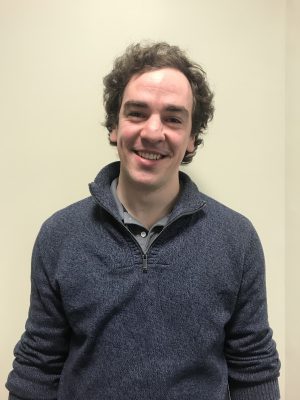 Adjunct Professor
Adjunct Professor 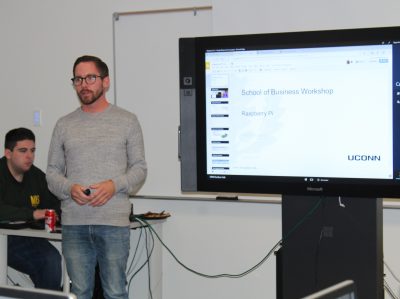 On Friday, December 1, the Operations and Information Management (OPIM) Department held it’s last workshop of the semester on Microcontroller Applications. Microcontrollers are small circuit boards that have the computer power to perform different tasks. There are three common brands of microcontrollers, including Raspberry Pi, Arduinos, and Intel Edisons. Although the OPIM Department has all three types, this workshop used Raspberry Pis to enhance the hands on experience of the activities. So far there have a number of versions of Raspberry Pis manufactured and each version has gotten better over time adding additional hardware and features including wireless and Bluetooth technology. Microcontrollers are so open ended, anyone can benefit from their use.
On Friday, December 1, the Operations and Information Management (OPIM) Department held it’s last workshop of the semester on Microcontroller Applications. Microcontrollers are small circuit boards that have the computer power to perform different tasks. There are three common brands of microcontrollers, including Raspberry Pi, Arduinos, and Intel Edisons. Although the OPIM Department has all three types, this workshop used Raspberry Pis to enhance the hands on experience of the activities. So far there have a number of versions of Raspberry Pis manufactured and each version has gotten better over time adding additional hardware and features including wireless and Bluetooth technology. Microcontrollers are so open ended, anyone can benefit from their use.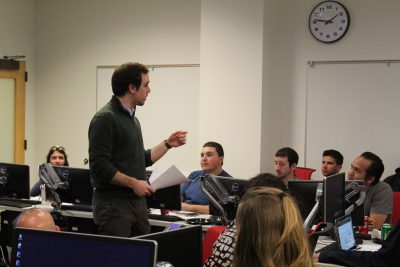 Blockchain is a peer to peer distributed database that records transactions. “Everyone can have a copy of the ledger, the list of all records, and see every transaction. Because everyone has this ability, everyone can check and make sure that the lists are correct,” said Fitzgerald. Each group of transactions gets added to the ledger as a different block, and it becomes a chain because each block builds upon the data from the first block. Although the concept of Blockchain is relatively new, it is not a new technology. Instead, it is a system that uses existing technologies, that wouldn’t normally be combined, in new ways. “It’s sort of a greater than the sum of its parts product” using elements of cryptography, accounting, and math to create the database.
Blockchain is a peer to peer distributed database that records transactions. “Everyone can have a copy of the ledger, the list of all records, and see every transaction. Because everyone has this ability, everyone can check and make sure that the lists are correct,” said Fitzgerald. Each group of transactions gets added to the ledger as a different block, and it becomes a chain because each block builds upon the data from the first block. Although the concept of Blockchain is relatively new, it is not a new technology. Instead, it is a system that uses existing technologies, that wouldn’t normally be combined, in new ways. “It’s sort of a greater than the sum of its parts product” using elements of cryptography, accounting, and math to create the database.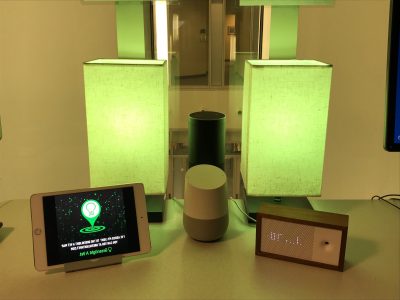 On Friday November 10th, LIFX, a company that creates smart lightbulbs, decided to participate in a movement that began in 2013, Greenlight A Vet. The company states that changing your lights to green is an easy way to establish visual support for America’s veterans by changing lights to green. The color green represents hope and positive well-being and green light is to show forward movement or advancement towards the cause. Once a participant change their lights to a particular color green they will appear on the LIFX greenlight map. The green light map shows where people in the United States have been using the app to change their lights to green. To raise awareness of the campaign, participants are encouraged to share their green light on the map and post on social media. A a user is encouraged to share a photo of the green light using the hashtag #greenlightavet. If not interested in sharing a photo, an alternative way to raise awareness is by applying the Greenlight A Vet filter onto a profile picture on Facebook.
On Friday November 10th, LIFX, a company that creates smart lightbulbs, decided to participate in a movement that began in 2013, Greenlight A Vet. The company states that changing your lights to green is an easy way to establish visual support for America’s veterans by changing lights to green. The color green represents hope and positive well-being and green light is to show forward movement or advancement towards the cause. Once a participant change their lights to a particular color green they will appear on the LIFX greenlight map. The green light map shows where people in the United States have been using the app to change their lights to green. To raise awareness of the campaign, participants are encouraged to share their green light on the map and post on social media. A a user is encouraged to share a photo of the green light using the hashtag #greenlightavet. If not interested in sharing a photo, an alternative way to raise awareness is by applying the Greenlight A Vet filter onto a profile picture on Facebook.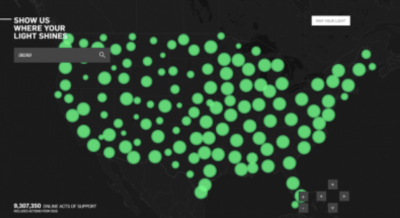
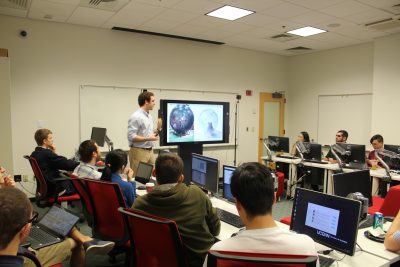 Virtual reality can be run through many different platforms but Professor Fitzgerald focused on the Unity software for the workshop. “The Unity engine is just something that has done all the hard work for you already. So the physics and the calculation of the computer code has all been done for you.” Giving students a background on the Unity engine will help them build confidence to be able to create their own virtual reality experiences.
Virtual reality can be run through many different platforms but Professor Fitzgerald focused on the Unity software for the workshop. “The Unity engine is just something that has done all the hard work for you already. So the physics and the calculation of the computer code has all been done for you.” Giving students a background on the Unity engine will help them build confidence to be able to create their own virtual reality experiences. 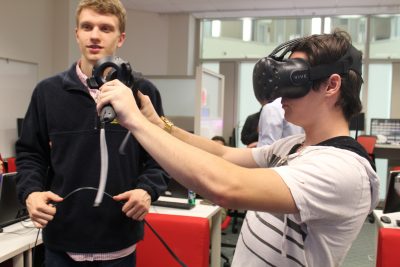 Although virtual reality is relatively new, its real world applications are endless. So far, it has been used to train doctors and surgeons, to treat people with anxiety and fears, to improve athletics, to train military personnel, to assist in construction and home design, and even to help paralyzed people walk again. In one instance during the workshop virtual reality was used along with a brain interface machine to restore people’s ability to walk when they were paralyzed. Because of virtual reality, paraplegics were able to have their bodies recreate cells that wouldn’t have otherwise been created in order to get themselves to walk again.
Although virtual reality is relatively new, its real world applications are endless. So far, it has been used to train doctors and surgeons, to treat people with anxiety and fears, to improve athletics, to train military personnel, to assist in construction and home design, and even to help paralyzed people walk again. In one instance during the workshop virtual reality was used along with a brain interface machine to restore people’s ability to walk when they were paralyzed. Because of virtual reality, paraplegics were able to have their bodies recreate cells that wouldn’t have otherwise been created in order to get themselves to walk again.